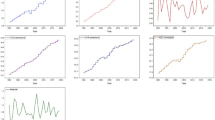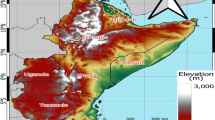Abstract
The dependency of Nigeria on the importation of food will likely be accentuated by changing climate thereby necessitating the existing focus on climate-food production nexus. Hence, the impact of carbon dioxide emissions on food production is examined in Nigeria’s context. With the use of autoregressive distributed lag (ARDL) and vector error correction mechanism (VECM), results show that carbon emissions (CO2) serve as a significant determinant of food production. Findings reveal that an increase in CO2 is expected to bring more acute food shortages, indicating that the impact of climate change on the production of food is adverse. Bidirectional causality found between carbon emissions and food production suggests that both indicators affect each other in the long-run. It is therefore posited that the prevalence of unsustainable agricultural practices in the country would possibly induce a rise in CO2 in the long-term. On the other hand, a rapidly changing climate could further worsen insufficient food production. Thus, policy measures that enhance sustainable agricultural practices and food security and ensure climatic resilience are considered central.
Similar content being viewed by others
Data availability
Data used for the study are available upon request.
Notes
How to roast a chicken: Climate change and farming in Nigeria | Business and Economy | Al Jazeera.
References
Ahmad S, Abbas G, Ahmed M, Fatima Z, Anjum MA, Rasul G et al (2019) Climate warming and management impact on the change of phenology of the rice-wheat cropping system in Punjab, Pakistan. Field Crops Res 230:46–61. https://doi.org/10.1016/j.fcr.2018.10.008
Aryal JP, Sapkota TB, Khurana R, Khatri-Chhetri A, Jat ML (2019) Climate change and agriculture in South Asia: adaptation options in smallholder production systems. Environ Develop Sustain 20:1–31. https://doi.org/10.1007/s10668-019-00414-4
Asseng S, Martre P, Maiorano A, Rotter RP, O’leary, G. J., Fitzgerald, G. J., et al (2019) Climate change impact and adaptation for wheat protein. Glob Change Biol 64:155–173. https://doi.org/10.1111/gcb.14481
Banerjee O, Cicowiez M, Rios AR, de Lima CZ (2021) Climate change impacts on agriculture in Latin America and the Caribbean: an application of the integrated economic-environmental modeling (IEEM) platform (No. 11777). Inter-Am Dev Bank. https://doi.org/10.18235/0003794
Brown RL, Durbin LJ, Evans JM (1975) Techniques for testing the constancy of regression relationships over time (with discussion). J R Stat Soc, B 37:149–192
Cattaneo C, Beine M, Fröhlich CJ, Kniveton D, Martinez-Zarzoso I, Mastrorillo M, Millock K, Piguet E, Schraven B (2019) Human migration in the era of climate change. Rev Environ Econ Policy 13(2):189–206. https://doi.org/10.1093/reep/rez008
CDIAC (2020) Carbon dioxide information analysis center 2020. Available online: www.cdiac.ess-dive.lbl.gov. Accessed 13 Nov 2020
Challinor AJ, Watson J, Lobell DB, Howden SM, Smith DR, Chhetri N (2014) A meta-analysis of crop yield under climate change and adaptation. Nat Clim Chang 4:287–291
Conrad R (2020) Methane production in soil environments—Anaerobic biogeochemistry and microbial life between flooding and desiccation. Microorganisms 8(6):881. https://doi.org/10.3390/microorganisms8060881
Conrow J (2021) Nigeria needs biotechnology to weather climate change impacts on farming, say West African scientists. Available online: https://allianceforscience.cornell.edu/blog/2021/11/nigeria-needs-biotechnology-to-weather-climate-change-impacts-on-farming-say-west-african-scientists/. Accessed 18 June 2022
Davamani V, Parameswari E, Arulmani S (2020) Mitigation of methane gas emissions in flooded paddy soil through the utilization of methanotrophs. Sci Total Environ 726:138570. https://doi.org/10.1016/j.scitotenv.2020.138570
Dithmer J, Abdulai A (2017) Does trade openness contribute to food security? A dynamic panel analysis. Food Policy 69:218–230
Emadodin I, Corral DEF, Reinsch T, Kluß C, Taube F (2021) Climate change effects on temperate grassland and its implication for forage production: a case study from Northern Germany. J Agric 11(3):23–42. https://doi.org/10.3390/agriculture11030232
Engle RF, Granger CJ (1987) Cointegration and error-correction-representation, estimation and testing. Econometrica 55:251–278
Enisan AA, Olufisayo AO (2009) Stock market development and economic growth: evidence from seven sub-Sahara African countries. J Econ Bus 61(2):162–171. https://doi.org/10.1016/j.jeconbus.2008.05.001
Fagbemi F (2020) Assessing the role of governance in West African fiscal performance. Am Econ 65(1):97–122
Fagbemi F, Adeoye GO (2020) Nigerian governance challenge: exploring the role of natural resource rents. Glob J Emerg Market Econ https://doi.org/10.1177/0974910120919001
Fagbemi F, Ajibike JO (2022) West African emerging economies: comparative insights on Ghana’s and Nigeria’s stock market development. Am J Econ Bus Adm 14:55–67
Fagbemi F, Oke DF, Fajingbesi A (2023) Climate-resilient development: an approach to sustainable food production in sub-Saharan Africa. Future Foods 7:100216
FAO (2015) Climate change and food security: risks and responses. Food and Agriculture Organization of the United Nations, Rome
FAO (2023) Nigeria agriculture at a glance. Food and Agriculture Organization of the United Nations, Rome. https://www.fao.org/nigeria/fao-in-nigeria/nigeria-at-a-glance/en/. Accessed 06 May 2023
Gedik MA, Günel T (2021) The impact of climate change on edible food production: a panel data analysis. Acta Agric Scand Section B 71(5):318–323. https://doi.org/10.1080/09064710.2021.1897155
Habib-ur-Rahman M, Ahmad A, Raza A, Hasnain MU, Alharby HF, Alzahrani YM, Bamagoos AA, Hakeem KR, Ahmad S, Nasim W, Ali S, Mansour F, el Sabagh A (2022) Impact of climate change on agricultural production; Issues, challenges, and opportunities in Asia. Front Plant Sci 13:925548. https://doi.org/10.3389/fpls.2022.925548
Henderson J, Godar J, Frey GP, Börner J, Gardner T (2021) The Paraguayan Chaco at a crossroads: drivers of an emerging soybean frontier. J Reg Environ Chang 21(3):1–14. https://doi.org/10.1007/s10113-021-01804-z
Hussain S, Huang J, Huang J, Ahmad S, Nanda S, Anwar S, Shakoor A, Zhu Ch, Zhu L, Cao X, Jin Q, Zhang J (2020) Rice production under climate change: adaptations and mitigating strategies. Environ Climate Plant Veget Growth 659–686. https://doi.org/10.1007/978-3-030-49732-3_26
Idumah FO, Mangodo C, Ighodaro UB, Owombo PT (2016) Climate change and food production in Nigeria: implication for food security in Nigeria. J Agric Sci 8(2):74–83
IPCC (2014) Climate change 2014: synthesis report. In: Pachauri RK, Meyer LA (eds) Contribution of working groups I, II and III to the fifth assessment report of the intergovernmental panel on climate change. IPCC, Geneva. 151p
Islam MS, Wong AT (2017) Climate Change and Food In/Security: a Critical Nexus. Environments 2017 4(2):38. https://doi.org/10.3390/environments4020038
Jatoi WN, Mubeen M, Ahmad A, Cheema MA, Lin Z, Hashmi MZ (2021) Building climate resilience in agriculture. J Agric 6(2):17–32. https://doi.org/10.1007/978-3-030-79408-8
Jayne T, Yeboah C, Henry C (2017) The future of work in African agriculture: trends and drivers of change. International Labour Organization (ILO), Research Department Working Paper no. 25. https://www.ilo.org/global/research/publications/working-papers/WCMS_624872/lang--en/index.htm
Kang Y, Khan S, Ma X (2009) Climate change impacts on crop yield, crop water productivity and food security–a review. Prog Nat Sci 19(12):1665–1674
Karimi V, Karami E, Keshavarz M (2018) Climate change and agriculture: impacts and adaptive responses in Iran. J Integr Agric 17(1):1–15. https://doi.org/10.1016/S2095-3119(17)61794-5
Khan NA, Gao Q, Abid M, Shah AA (2021) Mapping farmers’ vulnerability to climate change and its induced hazards: evidence from the rice-growing zones of Punjab. Pak Environ Sci Pollut Res 28(4):419–424. https://doi.org/10.1007/s11356-020-10758-4
Lima VP, de Lima RAF, Joner F, Siddique I, Raes N, Ter Steege H (2022) Climate change threatens native potential agroforestry plant species in Brazil. Sci Rep 12:1–14. https://doi.org/10.1038/s41598-022-06234-3
Lybbert TJ, Sumner DA (2012) Agricultural technologies for climate change in developing countries: policy options for innovation and technology diffusion. Food Policy 37:114–123. https://doi.org/10.1016/j.foodpol.2011.11.001
Malhi GS, Kaur M, Kaushik P (2021) Impact of climate change on agriculture and its mitigation strategies: a review. Sustain 13:1318. https://doi.org/10.3390/su13031318
Mano R, Nhemachena C (2007) Assessment of the economic impacts of climate change on agriculture in Zimbabwe: a Ricardian approach. World Bank, Washington DC. Policy Research Working Paper Series, 4292
Mendelsohn R (2009) The impact of climate change on agriculture in developing countries. J Nat Res Policy Res 1:5–19
Mendelsohn RW, Nordhaus D, Shaw D (1994) The impact of global warming on agriculture: a ricardian analysis. Am Econ Rev 84(4):753–771
Miles-Novelo A, Anderson CA (2019) Climate change and psychology: effects of rapid global warming on violence and aggression. J Curr Climate Chang Rep 5(1):36–46. https://doi.org/10.1007/s40641-019-00121-2
Myers SS, Smith MR, Guth S, Golden CD, Vaitla B, Mueller ND et al (2017) Climate change and global food systems: potential impacts on food security and undernutrition. Ann Rev Public Health 38:259–277. https://doi.org/10.1146/annurev-publhealth-031816-044356
Nkondze MS, Masuku MB, Manyatsi AM (2014) The impact of climate change on livestock production in Swaziland: the case of mpolonjeni area development programme. J Agric Stud 2(1):1–15
Ortiz-Bobea A, Ault TR, Carrillo CM, Chambers RG, Lobell DB (2021) Anthropogenic climate change has slowed global agricultural productivity growth. Nat Clim Chang 11(4):306–312. https://doi.org/10.1038/s41558-021-01000-1
Parker L, Bourgoin C, Martinez-Valle A, Läderach P (2019) Vulnerability of the agricultural sector to climate change: the development of a pan-tropical climate risk vulnerability assessment to inform sub-national decision making. PLoS ONE 14(3):e0213641. https://doi.org/10.1371/journal.pone.0213641
Pesaran MH, Shin Y, Smith RJ (2001) Bounds testing approaches to the analysis of level relationships. J Appl Economet 16:289–326
Powell JP, Reinhard S (2016) Measuring the effects of extreme weather events on yields. Weather Clim Extrem 12:69–79
Rehman TH, Shah AK, Hussain SJ (2022) Effect of climate change on agricultural productivity in Japan. J Agric 6(1):13–23
Santangelo GD (2018) The impact of FDI in land in agriculture in developing countries on host country food security. J World Bus 53(1):75–84
Singh C, Tiwari S, Boudh S, Singh JS (2017) Biochar application in management of paddy crop production and methane mitigation. Agro-Environ Sustain 123–145. https://doi.org/10.1007/978-3-319-49727-3_7
Solomon R, Simane B, Zaitchik BF (2021) The impact of climate change on agriculture production in ethiopia: application of a dynamic computable general equilibrium model. Am J Clim Chang 10:32–50. https://doi.org/10.4236/ajcc.2021.101003
Tajudeen TT, Omotayo A, Ogundele FO, Rathbun LC (2022) The effect of climate change on food crop production in Lagos state. Foods 2022(11):3987. https://doi.org/10.3390/foods11243987
The Global Alliance for Improved Nutrition (2022) Nigeria’s food system challenged by conflicts, climate change and economic headwinds. https://www.preventionweb.net/news/nigerias-food-system-challenged-conflicts-climate-change-and-economic-headwinds
Thomas A, Turk R (2023) Food insecurity in Nigeria: food supply matters. International Monetary Fund (IMF), IMF selected issues paper, African Department, SIP/2023/018. https://www.imf.org/en/Publications/selected-issues-papers/Issues/2023/03/07/Food-Insecurity-in-Nigeria-Food-Supply-Matters-Nigeria-Nigeria-530623
Van der Merwe E, Clance M, Yitbarek E (2022) Climate change and child malnutrition: a Nigerian perspective. Food Policy. https://doi.org/10.1016/j.foodpol.2022.102281
World Bank (2013) Turn down the heat: climate extremes, regional impacts, and the case for resilience, vol 2. The World Bank, Washington, DC
World Bank (2023) World development indicators. The World Bank, Washington DC
Xu Y, Chu C, Yao S (2021) The impact of high-temperature stress on rice: challenges and solutions. Crop J 9:963–976. https://doi.org/10.1016/j.cj.2021.02.011
Yoro KO, Daramola MO (2020) CO2 emission sources, greenhouse gases, and the global warming effect. In advances in carbon capture. Woodhead Publishing, pp 3–28. https://doi.org/10.1016/B978-0-12-819657-1.00001-3
Yu J, Peng S, Chang J, Ciais P, Dumas P, Lin X, Piao S (2018) Inventory of methane emissions from livestock in China from 1980 to 2013. Atmos Environ 184:69–76. https://doi.org/10.1016/j.atmosenv.2018.04.029
Zaidi SH, Hussain M, Zaman QU (2021) Dynamic linkages between financial inclusion and carbon emissions: evidence from selected OECD countries. Resour Environ Sustain 4:100022
Zhang P, Zhang J, Chen M (2017) Economic impacts of climate change on agriculture: the importance of additional climatic variables other than temperature and precipitation. J Environ Econ Manag 83:8–31
Zhang Y, You Q, Mao G, Chen C, Ye Z (2019) Short-term concurrent drought and heatwave frequency with 1.5 and 2.0 C global warming in humid subtropical basins: a case study in the Gan River Basin China. Clim Dyn 52(7):4621–4641. https://doi.org/10.1007/s00382-018-4398-6
Zilberman D, Liu X, Holst DR, Sunding D (2004) The economics of climate change in agriculture. Mitig Adapt Strateg Glob Chang 9:365–382
Author information
Authors and Affiliations
Contributions
Fisayo Fagbemi: conceptualization, formal analysis and interpretation, validation, writing—original draft; Dorcas Funmilola Oke: conceptualization, writing—review and editing, and project supervision; Olawale Daniel Akinyele: conceptualization, writing literature review, data curation, validation; Kehinde Mary Bello: conceptualization, literature review and validation.
Corresponding author
Ethics declarations
Conflict of interest
The authors declare no competing interests.
Rights and permissions
Springer Nature or its licensor (e.g. a society or other partner) holds exclusive rights to this article under a publishing agreement with the author(s) or other rightsholder(s); author self-archiving of the accepted manuscript version of this article is solely governed by the terms of such publishing agreement and applicable law.
About this article
Cite this article
Fagbemi, F., Oke, D.F., Akinyele, O.D. et al. Carbon emissions and food production: why climate change is a threat to Nigeria’s food security. J Environ Stud Sci (2024). https://doi.org/10.1007/s13412-024-00916-2
Accepted:
Published:
DOI: https://doi.org/10.1007/s13412-024-00916-2





